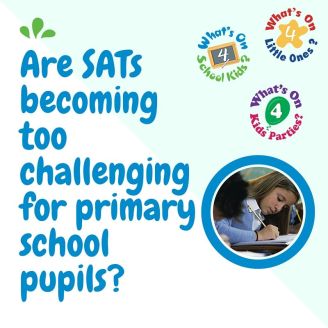As we’ve now come to the end of the academic year with a fantastic round up of  celebration assemblies throughout the UK recognising our children’s academic and non academic achievements, maybe it’s time to reflect ourselves on some of the hurdles that our little ones will have to or have had to jump.
celebration assemblies throughout the UK recognising our children’s academic and non academic achievements, maybe it’s time to reflect ourselves on some of the hurdles that our little ones will have to or have had to jump.
Are SATs becoming too challenging for primary school pupils?
‘Incredibly difficult’ and ‘ridiculous’ primary school tests left pupils in tears as they struggled to cope with tough new Government guidelines, according to concerned teachers.
Comments reported by the Daily Telegraph revealed how children had struggle to cope with the tests administered to years two and six this year.
Teachers also told the TES that they were concerned about what children were being asked to do on the reading, writing and maths papers.
One said: “That was, without doubt, the hardest reading test I’ve ever seen. Unbelievable. I’m so angry right now. That has completely demoralised a number of children in my class. It wasn’t even like the sample paper they released. Much harder.”
Another said the SATs their children undertook would’ve be more suitable to much older children, writing: “Children who had succeeded previously in the ‘sample’ test were sobbing! More able not finishing. If ever a test was set up to prepare children to fail, this was it.”
Tough questions
One University of Oxford professor pointed out that a question on angles was more suited to a ‘lower to mid standard’ GCSE test than one to be undertaken by 11-year-olds.
Meanwhile schools minister Nick Gibb was caught out on live radio, when World At One presenter Marth Kearney asked him to decide whether a word in a sentence was a preposition or a subordinating conjunction – just as SATs pupils had to do when answering grammar questions. He failed the test.
The Manchester Evening News published a list of 12 sample questions from the year two and six papers, if readers wanted to see if they could succeed where Gibb couldn’t.
The results
So, if the questions were so tough, what were the results like?
The official data showed that just over half of 11-year-olds (53 per cent) made the expected grade in all three of reading, writing and maths. That figure last year, albeit under a completely different system, was 80 per cent.
Again, it’s wrong to compare the two figures outright – and the number of pupils achieving the expected level in each individual subject is higher – but the Government will clearly want to see that figure going up. Statistically, at least, the tests could be seen as too challenging for almost half of the pupils who took them.
Government response
A Department of Education spokesman defended the new tougher tests, which aimed to push pupils to achieve higher standards. They said: “These tests should not be a cause of stress for pupils - they help teachers make sure children are learning to read, write and add up well.
“The truth is if they don’t master literacy and numeracy early on, they risk being held behind and struggling for the rest of their lives – we are determined to prevent this by helping every child reach their full potential.”
It’s also fair to say that all new exam systems take time, with a need to find the right level of difficulty on tests papers.
Image of the profession matters
The row over SATs is set within a wider atmosphere of negativity within the teaching profession, with a recent strike highlighting anger at cuts to school budgets.
Former education secretary Nicky Morgan raised this, asking the unions not to ‘talk down’ the profession and give it a bad name. While her comments didn’t go down well with everyone, her successor Justine Greening will certainly hope to establish a more harmonious relationship with teachers than either of her two predecessors.
That’s especially true in the midst of a recruitment crisis – with politicians keen to get good graduates and jobhunters turning to the likes of EduStaff and putting their talents to good use in jobs within the profession.
Perhaps one way to set the right tone would be for Greening to have a thorough look at the positives and negatives of this year’s SATs tests. It’s clear that teachers and pupils have made the case that this year’s exams went a little too far. By showing she can listen and rein this in slightly, Greening would certainly curry favour with pupils, parents and teachers alike.
